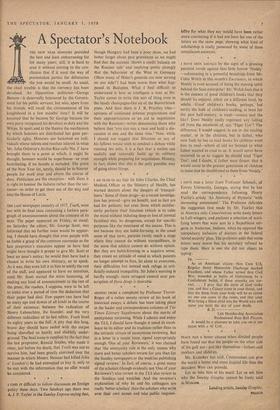I FIND IT difficult to follow discussion on foreign policy
these days. Two Sundays ago there was A. J. P. Taylor in the Sunday Express saying that, though Hungary had been a poor show, we had better forget about past grievances as we might find that the account 'shows a credit balance on the Russian side' and implying pretty strongly that the behaviour of the West in Germany ('How many of Hitler's generals are now serving on our side?') had been worse than what hap- pened in Budapest. What I find difficult to understand is how so intelligent a man as Mr. Taylor comes to write this sort of thing even in the heady champagne-like air of the Beaverbrook press. And then there is J. B. Priestley who— apropos of continued defence preparations and their appropriateness as ' an aid to negotiation with the Russians—writes denouncing those who believe that 'you can run a race and hold a dis- cussion at one and the same time.' Now, while I should not suggest that Ibbotson or any of his fellows would wish to conduct a debate while running the mile, it is a fact that a nation can usefully and rationally build up its military strength while preparing for negotiation. History, in fact, shows that this is the only possible way of going about things.










































 Previous page
Previous page